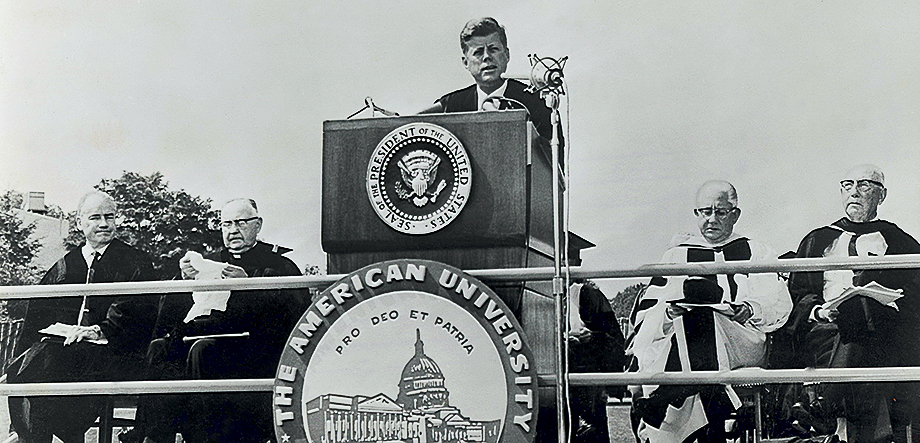RFK recently called for a 50% reduction in annual defense spending, which at the Pentagon’s current bloated budget level would still leave $450 billion to insure the security and liberty of the American homeland. Not only is that more than enough, but the number itself has an uncanny level of historical verisimilitude.
As it happens, that was the level of the defense budget in today’s dollars of purchasing power when Kennedy’s uncle gave his powerful American University speech in June 1963. This soaring oration was delivered at the height of the cold war when the Soviet Union was still at the peak of its industrial and military vigor and just months after the Cuban Missile Crisis when the world had looked into the abyss of nuclear Armageddon.
Needless to say, the conventional politicians of the time were in a mode of full-throated anti-Soviet belligerence, yet JFK saw fit to make the greatest peace speech ever delivered by an American president. He well understood that at the then current level of defense spending, America had more than enough military capacity and deterrence power to discourage any would be aggressor, but that an adequate defense capability was but a pre-condition for the true security of a peaceful de-militarized world:
I am talking about genuine peace, the kind of peace that makes life on earth worth living, the kind that enables men and nations to grow and to hope and to build a better life for their children–not merely peace for Americans but peace for all men and women–not merely peace in our time but peace for all time.

Since then there have been two huge changes in global geopolitics that have made the world far, far less threatening than the one JFK had faced months earlier during October 1962. To wit:
- The massively militarized, economically autarkic Soviet Empire has disappeared into the dustbin of history.
- The incipient militarized state in Red China under Mao failed and was turned outward and transformed into a commercial export powerhouse by Deng Xiaoping after the early 1990s.
These epochal changes have profound significance for America’s homeland security. In the absence of a massively militarized autarkic state capable of global military power projection, the way is once again clear for a far more modest Fortress America national security posture.
To the point, today’s Russia is but a shadow of the Soviet Union with a GDP of just $2 trillion versus the $50 trillion of Europe and North America. And rather than absorbing upwards of one-third of GDP as in Soviet times, Russia’s paltry $60 billion defense budget prior to its special operation in Ukraine amounted to just 3.5% of GDP.


